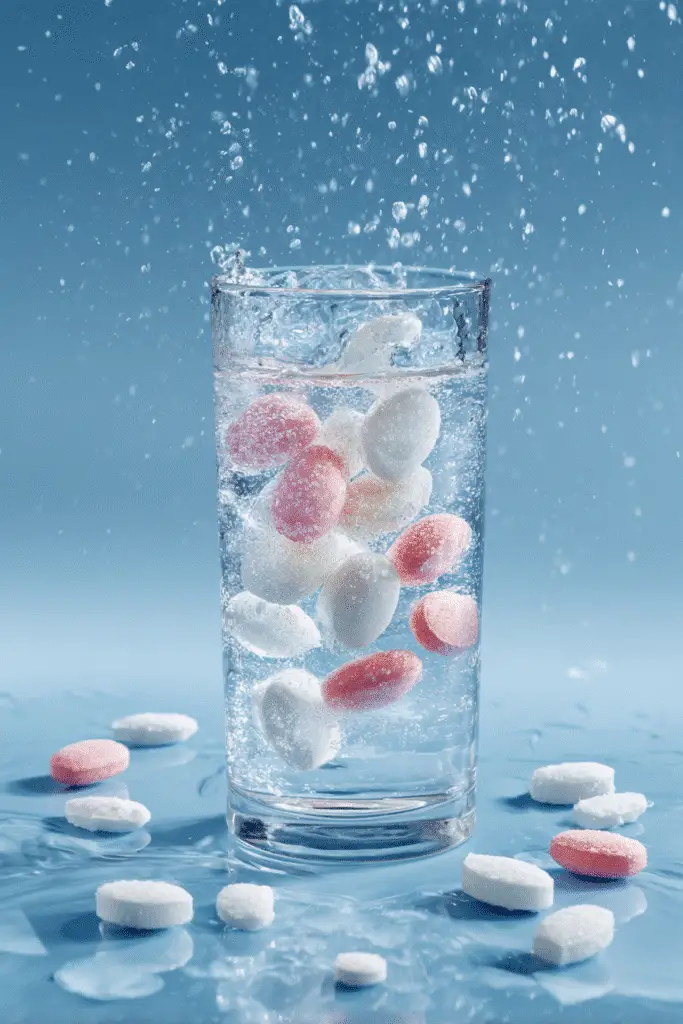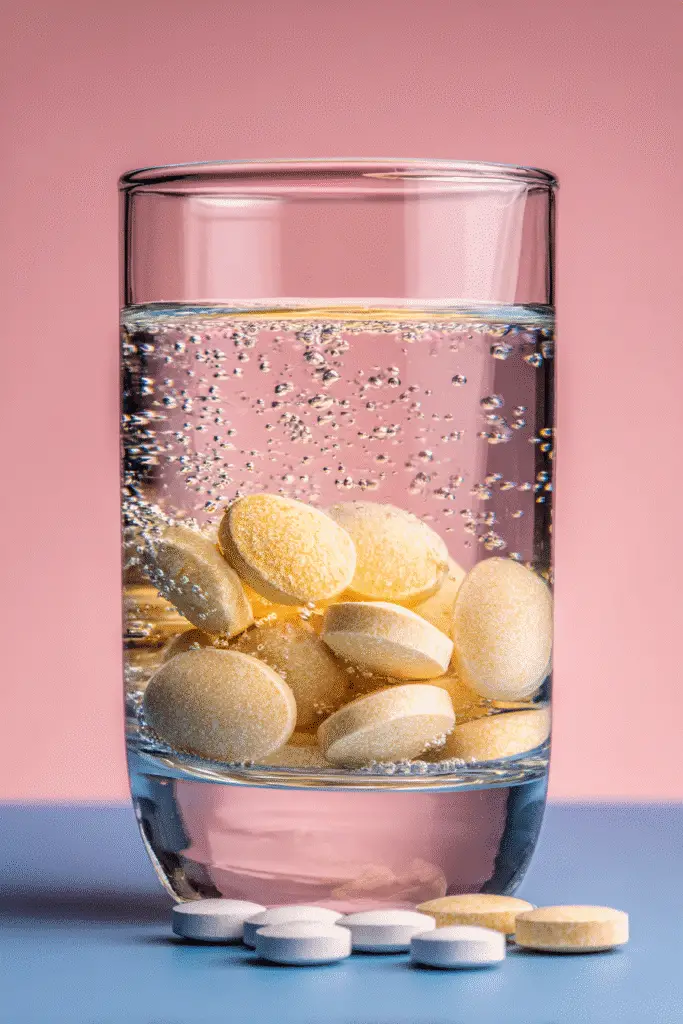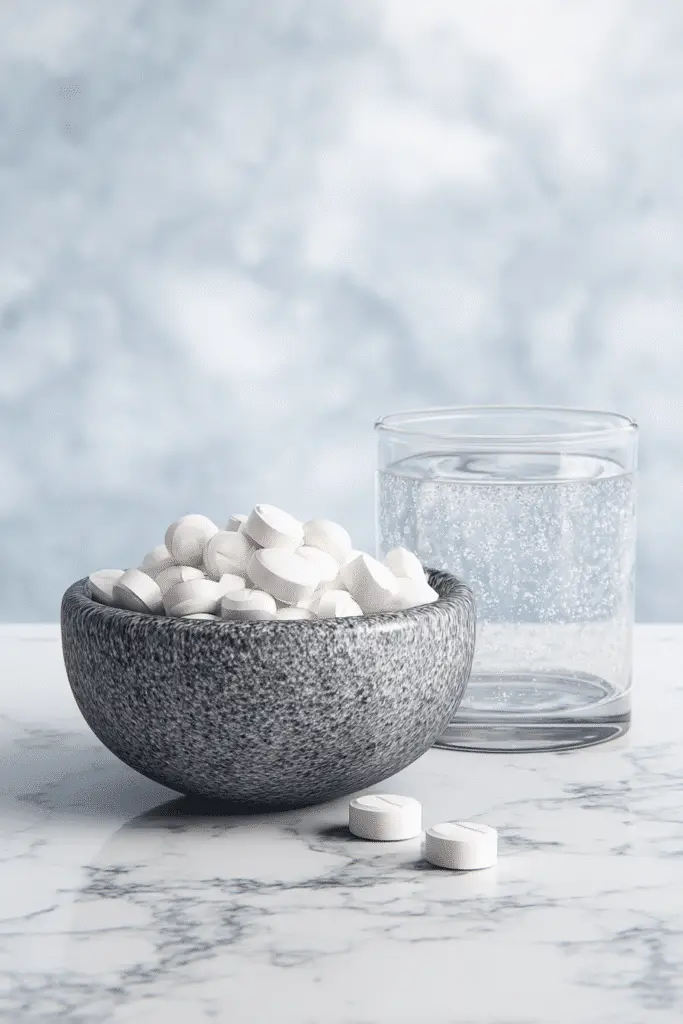Calcium supplements Kidney Stones are often praised for keeping bones strong, but there’s one question that sparks confusion every time: can taking too much calcium cause kidney stones? At first glance, it makes sense to worry—after all, most kidney stones are made of calcium. But the truth isn’t that simple.

Health researchers and kidney specialists say calcium isn’t usually the villain. In fact, the right balance of calcium in your diet may actually protect you from stones. Other factors—like how much sodium (salt) you eat, how hydrated you are, and whether you rely more on supplements than food sources—often play a bigger role.
In this article, we’ll break down what science says about calcium, kidney stones, and your diet. You’ll discover why cutting calcium could backfire, why oxalates in foods matter, and why salt—not supplements—is often the real culprit.
Table of Contents
How Calcium and Oxalate Form Stones
Calcium supplements Kidney stones form when tiny waste particles in urine stick together and harden into crystals. One of the most common types—calcium oxalate stones—develops when calcium binds with oxalate, a natural compound found in plant foods like spinach, almonds, and beets.
Here’s the twist: it’s not simply about eating more or less calcium. If there’s too much oxalate floating around in your urine and not enough calcium to bind with it in your gut, oxalate ends up being absorbed into your bloodstream. From there, it passes into your kidneys, where it can crystallize and form stones.
Certain conditions, such as hypercalciuria (excess calcium in the urine) or hyperparathyroidism (excess calcium in the blood), can make some people more prone to these stones. But for most healthy people, drinking enough water, moderating salt intake, and balancing calcium with oxalate-rich foods makes a far bigger difference than simply avoiding calcium.
Excess Calcium Isn’t the Main Cause of Kidney Stones
It’s natural to assume that if kidney stones contain calcium, taking extra calcium must be the problem. But that’s not usually the case.

Doctors often point out that most kidney stones don’t form just because someone takes a calcium supplement kidney stones. In fact, research shows that when calcium intake is within healthy limits (around 1,000–1,300 mg per day for most adults), the mineral is more protective than harmful.
Here’s why:
- If your body gets enough calcium from food or supplements, it binds with oxalates in the digestive tract, carrying them out in your stool instead of your urine.
- Without that calcium, oxalates slip through into your kidneys, where they can crystallize into stones.
So while it’s true that mega-doses of supplements may leave extra calcium to be flushed out in urine, experts emphasize that salt intake, hydration, and genetics usually play a far bigger role than calcium itself.
Dietitians often say it’s more dangerous to cut calcium too low than to take a reasonable supplement.
Getting Enough Calcium Reduces Kidney Stone Risk
Here’s one of the biggest surprises: a low-calcium diet can actually raise your risk of kidney stones.
When you eat foods high in oxalates—like almonds, spinach, or beets—you need calcium present in your gut to grab onto those oxalates and send them out through stool. Without enough calcium, oxalates pass into your bloodstream and make their way to your kidneys, where they can crystalize into stones.
Studies have consistently shown:
- People who cut out calcium are more likely to form stones.
- People who eat adequate calcium from foods like yogurt, cheese, and milk actually lower their risk.
- The most effective way to reduce oxalate levels in urine is simply making sure you’re getting enough calcium in your diet each day.
As one kidney nutrition expert explains: “Calcium isn’t the problem—it’s part of the solution.”
The bottom line? Getting enough calcium (not too little, not too much) keeps your kidneys happier.
A High Sodium Diet Is More Likely to Cause Stones
If you’re looking for the real dietary culprit behind calcium-oxalate stones, look no further than sodium (salt).
Doctors explain it this way:
- When you eat moderate amounts of salt, your body balances sodium and calcium well.
- But when you eat too much sodium, your kidneys are forced to flush out both sodium and calcium together.
- That extra calcium in urine is more likely to crystallize and form stones.
In fact, many nephrologists first recommend cutting back on salty foods—like chips, packaged meals, and fast food—before even touching calcium intake.
And here’s the simple fix:
- Aim for less than 2,300 mg of sodium per day (that’s about one teaspoon of salt).
- Stay well-hydrated, since water helps flush out both sodium and oxalates before they can bind in your kidneys.
The surprising truth? Too much salt is more likely to trigger kidney stones than Calcium supplements Kidney stones ever will.

Food-Based Calcium Is Better Than Supplements
When it comes to calcium, food beats pills almost every time.
Your body absorbs and uses calcium more effectively from food sources—like milk, yogurt, cheese, and fortified plant milks—compared to supplements. Plus, dairy foods bring extra nutrients like protein and phosphorus that support bone and kidney health.
Plant-based calcium foods like kale or fortified almond milk are also helpful, but some naturally contain oxalates that reduce absorption. That’s why experts recommend not cutting out oxalate-rich foods completely—they also provide fiber, potassium, and magnesium, which lower stone risk. Instead, pair them with calcium-rich foods so the minerals can work together.
Supplements do have their place, especially for people with special conditions such as:
- Those who’ve had gastric bypass surgery
- People with Crohn’s disease or other digestive issues
- Anyone whose diet can’t consistently meet daily calcium needs
But overall, getting calcium through your meals is the most kidney-friendly strategy.

Conclusion
So, can calcium supplements kidney stones The answer is: not usually. Most stones form when too much sodium or too little hydration upset the balance in your kidneys—not from everyday calcium intake.
In fact, getting enough calcium—preferably from foods—may actually protect against stones by binding with oxalates before they reach your kidneys. For most people, focusing on hydration, lowering salt, and eating a balanced diet with steady calcium is the real key to prevention.
Instead of fearing calcium, think of it as your ally in kidney health. Supplements can be useful in special cases, but food-based calcium, paired with mindful eating, is where protection really starts.
Explore beautifully curated weight loss pink salt recipe ideas on Sofie Recipes on Pinterest and find your next favorite healthy habit!
FAQs
Does taking calcium supplements increase kidney stone risk?
No, not usually. For most people, supplements taken within the daily recommended range (1,000–1,300 mg) don’t increase risk. Other factors, like high salt intake and dehydration, play a bigger role.
Is it better to get calcium from food or supplements?
Yes—food is better. Your body absorbs calcium more effectively from food, especially dairy. Supplements are helpful only if your diet consistently falls short.
Can eating too little calcium cause kidney stones?
Yes. A low-calcium diet leaves oxalates unbound, increasing the chance they’ll form stones in your kidneys. Getting enough calcium actually helps lower stone risk.
What foods help prevent kidney stones?
Calcium-rich foods (like yogurt or fortified plant milk), paired with oxalate-rich foods (like spinach or almonds), plus staying hydrated and limiting salt, all help reduce stone risk.

